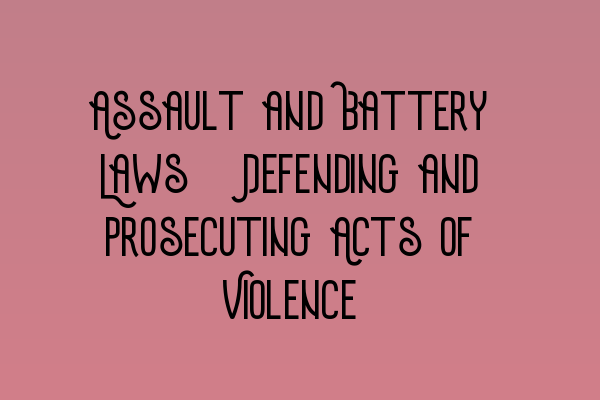Assault and Battery Laws: Defending and Prosecuting Acts of Violence
When it comes to criminal offenses, assault and battery are among the most common charges individuals may face. Understanding the intricacies of assault and battery laws is essential for both defense attorneys and prosecutors. In this article, we will delve into the details of defending and prosecuting acts of violence, equipping you with the knowledge to navigate this complex area of criminal law.
What is Assault and Battery?
Assault and battery are two separate but closely related offenses. Assault generally refers to the act of intentionally causing apprehension of harmful or offensive contact, whereas battery involves the physical act of intentionally and unlawfully touching or striking another person without their consent.
Assault and battery can vary in severity, ranging from simple assaults and batteries to more serious offenses like aggravated assault and battery. The precise definitions and penalties for these offenses may vary depending on the jurisdiction you are operating in.
Defending Assault and Battery Charges
Mounting a strong defense is crucial when faced with assault and battery charges. The defense strategies employed will depend on the specific circumstances of the case. Some common defenses include:
- Self-defense: Proving that the defendant acted in self-defense by demonstrating that their actions were necessary to protect themselves from harm.
- Lack of intent: Arguing that the defendant did not have the necessary intent to commit the assault or battery.
- Consent: Asserting that the alleged victim gave permission for the physical contact or assault to occur.
- Mistaken identity: Providing evidence that the defendant was not the person who committed the offense.
It is important for defense attorneys to thoroughly investigate the case, review the evidence, and consult with expert witnesses if necessary to build a solid defense strategy.
Prosecuting Assault and Battery Cases
Prosecuting acts of violence requires a strong understanding of the law and a careful presentation of evidence. To successfully prosecute assault and battery cases, prosecutors must:
- Evaluate the evidence: Collect as much evidence as possible, including witness statements, medical records, and any available video footage or photographs.
- Establish intent: Prove that the defendant had the intention to commit the assault or battery.
- Apply the relevant laws: Ensure that the specific elements required for assault and battery charges are met.
- Prepare witnesses: Interview and prepare witnesses to provide accurate and persuasive testimony.
Prosecutors must also stay updated with the latest developments in assault and battery laws to effectively argue their cases in court.
Get Professional Assistance for SQE Criminal Law & Practice
If you are pursuing a career in criminal law, it is vital to have a strong foundation in SQE Criminal Law & Practice. [CompanyName] offers comprehensive SQE 1 Preparation Courses and SQE 2 Preparation Courses to help you ace the SRA SQE exams. It is important to be prepared and confident when dealing with criminal cases, and our courses can provide you with the knowledge and skills you need to succeed.
To further enhance your preparation, we also offer SQE 1 Practice Exam Questions and SQE 1 Practice Mocks FLK1 FLK2. These resources enable you to test your understanding and identify areas for improvement.
Stay informed about upcoming SRA SQE Exam Dates to ensure you plan your studies effectively.
